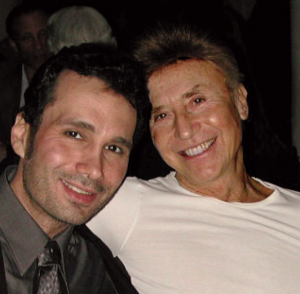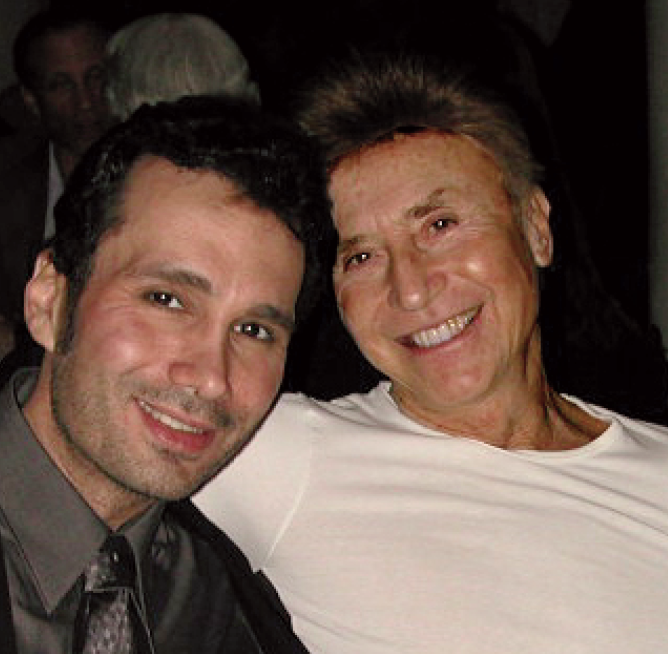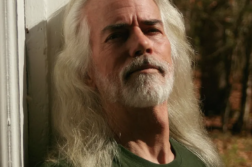Rechy’s autobiographical novel, City of Night, about a lonely hustler drifting across the country, first appeared in 1963, shocking the literary world and becoming a controversial bestseller. It was published before I was born, but when I came across it in a bookstore as a teenager, it almost jumped off the shelf. It was one of those inexplicable omens that happen a handful of times in a life. I started reading it right then and there. It knocked me out on so many levels. First, it introduced me to a world involving hustlers and johns and drag queens, all wearing carefully constructed masks to conceal inner vulnerabilities. I never knew anyone could write about this kind of decadent subject matter with such poetic intensity.
Rechy took a place in my heart that had until then been roped off for dead movie stars—those who had been isolated or lonely or in great pain. Rechy had the far away, unreachable vulnerability of Marilyn Monroe or Montgomery Clift. Rechy’s loneliness stemmed from the fact that he grew up homosexual in a Latino family in El Paso, Texas, during the 1930’s and 40’s. His father was a domineering, brutal man who saw homosexuality everywhere—and sensed it in his sullen, artistic son. The seeds of Rechy’s talent were always there, but his father’s contemptuous treatment of him isolated young John and imbedded in him a hunger to be great, to excel. So the boy nurtured his talent, and it took root. Yet by the 1950’s—even though he had graduated from college and had been in the army—Rechy felt so alienated, the only way he could express his sexuality was through hustling.

While working for a magazine in Los Angeles a few years ago, I had the opportunity to write a feature piece about Rechy, so I requested an interview with him and he agreed. But first he wanted me to visit one of the creative writing classes he conducted from his apartment. Fortified by a little scotch—quite a little, perhaps—I arrived at his door and discovered that the man who answered it was not the moody, brooding man I had imagined he’d be, the aloof hustler in City of Night or the cocky Johnny Rio from Numbers. Instead, he was affable, attractive, charming, and funny. Rechy, his students, and I all sat around his dining room table under huge portraits of Greta Garbo and Joan Crawford. I was drunk, which is when I take the most astute notes, but instead I simply watched and listened as he finished his class. He called his female students “darling.” “She was gorgeous, darling,” he told one young lady, describing a stripper he once met. They laughed. Then he turned to the work. Obviously he had read his students’ manuscripts carefully. He criticized them gently, praised them lavishly, and sprinkled his critiques with shrewd tips. They adored him.
Rechy liked the resulting article I wrote about him. Soon thereafter I had dinner with him and his longtime partner Michael, and I approached them with the idea of a biography. They agreed. But we weren’t sure what kind of a book it would be—if it would just be a brief introduction to “Rechy,” or a full authorized biography. We’d see as we went along.
Rechy and I often met during the week, always late in the afternoon. I had to take two buses to get there, carrying a bottle of white wine and a loaf of bread. I’d arrive early and sit at the bus stop waiting for the exact time. At the precise moment I’d knock on his door (his doorbell never worked—eventually it was covered with tape). From the window on the door I could peer into his living room and the short hall leading to the other rooms. A few seconds after I knocked, I would see Rechy emerge from his office where he’d been working. He’d stop in the bathroom leaving the door open. From where I stood I could look directly into the bathroom where Rechy gave himself a little primp in the mirror. He wasn’t primping specifically for me—Rechy, I’m sure, would primp for the mailman or a troop of girl scouts selling cookies.
Usually we would drink white wine and chat for an hour or two with the tape recorder running. Suddenly it would become dusk and we would finish our discussion in the shadows. Rechy began to trust me and the book grew into a full biography. We are alike in so many ways, both of us artistic, brooding, neurotic, self-centered Pisces. We both like to draw and write and dream. We’re both fascinated with Marilyn Monroe. Each of us recognized that desirability can be a weapon. We’re both, at heart, loners.
In the three years that I worked on the book, I went to his signings and speaking engagements. Audiences were there to see the hip stud of his books, and Rechy didn’t disappoint. As I got to know Rechy, I soon discovered that he’s many different personalities happily inhabiting the same buff body. He still can fall into a hustler’s stance, the casual leaning of the hip that comes naturally to him. His body remains remarkably youthful, lean, and tight. Usually he wears jeans and a tanktop or a tight spandex shirt. Often he wears a white muscle-shirt with black stripes down the sides. Once he told me, “I hope you know I have over ten of these shirts and it’s not always the same one.”
One of Rechy’s main themes is that narcissism is healthy. One night we were having dinner at his favorite restaurant. I told Rechy about breaking up with a boyfriend I was still in love with, who wanted to remain friends. But now our “friendship” consisted only of him telling me about a variety of sexual conquests, which hurt me terribly. Rechy immediately saw what my ex was up to. “He’s using you to stroke his ego,” Rechy scolded. “You’re much too special to let people use you that way.” I told him how, when my ex and I were dating, he often engaged handsome waiters in long conversations—leaving me sitting there, slowly turning to stone. “Oh, I never tolerated that,” Rechy said angrily. “I wouldn’t if I were out with a man, or just with friends.”
I always wondered how Rechy had grown so confident. We were alike in so many ways but, even though his childhood was far more painful than mine, he never doubted his sexual appeal or his talent. That’s where we were different. But it’s the paradoxes in Rechy—his assertiveness and vulnerability, his street tough image mixed in with his intellect, the respect of a renowned author combined with the isolation of a little boy —that makes him such a compelling writer, a distinction that started with his very first book.
Forty years after its publication, City of Night remains a remarkable achievement. It has since gone on to influence every generation of gay writers that followed. There are no explicit sex scenes, but its sad and funny characters reach out to anyone who has ever donned a mask to cover up scars or ever felt utterly and helplessly alone—calling to readers with the astonishing power of an artist who has the remarkable ability to transform all of his life experiences into the immortality of the written word.
Charles Casillo is the author of Outlaw: The Lives and Careers of John Rechy and The Marilyn Diaries, a novel.







Discussion1 Comment
Is it my imagination or do you look like young, young John Rechy? Wow.